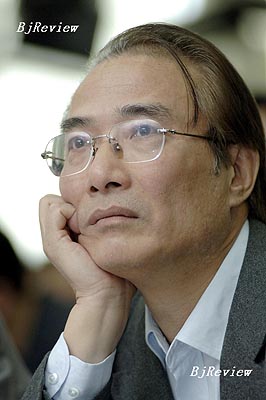
The friction between China and the United States, caused by an imbalance in bilateral trade, was further strained following a controversial report in Britain's Daily Telegraph on August 8. The report quoted two Chinese economists who purportedly warned that China might "liquidate its vast holdings of U.S. treasuries if America imposes trade sanctions to force a yuan revaluation."

Not so, said Xia Bin, Director of the Finance Research Institute of the State Council Development Research Center, China's top think tank, who responded saying he was misunderstood. "My point is not to sell off the greenbacks, but to suggest the government how to bargain with trade protectionists," Xia explained, denying any threatening remarks.
He Fan, a Harvard-trained economist at the Chinese Academy of Social Sciences, also argued that his comments that "gradual appreciation of the yuan benefits both China and the United States" were misinterpreted by Daily Telegraph.
In response to the London-based newspaper's reference in its report to a bill approved by the U.S. Senate Finance Committee in July requiring retaliatory tariffs against Chinese imports to force a faster appreciation of the Chinese currency, He revealed that the original source of his quote is an article he wrote in March of this year, which was published in China Daily on August 7. Both Xia and He said that Daily Telegraph had never contacted them on the reserve issue.
If China initiated a dump of its dollar assets, Daily Telegraph warned that the effect may impact other international investors, worsening the subprime mortgage crisis, causing a spike in U.S. bond yields, collapsing U.S. vulnerable housing market and eventually triggering an economic recession.
The depreciation of U.S. currency value and its economic recession, however, do not work in China's favor. More than 60-70 percent of the country's $1.33 trillion foreign exchange reserves are in dollars. In the event of a slump, China's foreign assets will shrink fast. Moreover, the United States is a major destination for Chinese export commodities, and any downturn in consumption will lead to a sharp decrease of exports, and increase in unemployment. In addition, depreciating the dollar could trigger a trade war that disrupts the world trade pattern and financial security.
"It is not true that China would use its foreign reserves as a political weapon. For China, safety, liquidity and investment returns are the priorities of its foreign exchange reserve management."
Report of Xinhua News Agency dated on August 12, quoting an anonymous official of China's central bank
"A blitz diversification of foreign exchange reserves for the purpose of threat or retaliation should never be a choice of China, as only a gradual process in this field conforms to China's national interests."
Zhang Ming, researcher with the Chinese Academy of Social Sciences
"Price rises of grain [used as animal feed] have remained stable and therefore it is not
rising costs, but a growing supply-demand gap of food products that has pushed up the price index."
Zhu Baoliang, Chief Economist with the State Information Center, challenging expectations that interest rate hikes will ease the surging inflation in China after the growth rate of
consumer price index reached 5.6 percent in July, the highest in a decade
"It is unlikely that we are out of the woods yet, as it will only take some bad news on hedge funds, or funding problems to reignite fears."
Stuart Bennett, economist at the investment bank Calyon, in response to world stock market tumbles in mid-August caused by
reemergence of rumors that more banks and hedge funds had been hit by financial losses from bad investments in high-risk U.S. sub prime home loans
"Here is a question of winning hearts and minds
of people."
Pakistani President Pervez Musharraf, calling
for tribesmen to assist the military in defeating
terrorism and discouraging extremism along the Afghan-Pakistani border at a meeting of 700 tribal leaders from both countries in Kabul on August 12
"A variety of natural disasters have affected 300 million people, destroyed 3 million homes and cost 20 million yuan in direct economic losses every year to China over the past 15 years."
The 11th Five-Year Plan (2006-10) for Disaster Relief Outlines of China
"Goodbye, good riddance."
Democratic presidential candidate John Edwards, responding to the August 13 quit of Karl Rove, the master political strategist behind President Bush's two election triumphs who was accused by opponents of devising a political strategy that has left the country more divided
| 